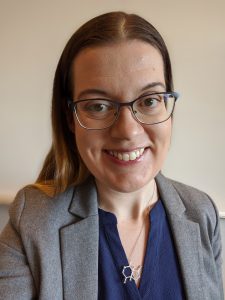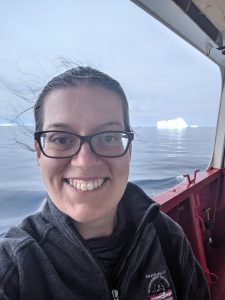In January of 2022, Dr. Cara Manning joined the faculty of the Department of Marine Sciences. Dr. Manning hails from Vancouver Island, Canada and has a PhD in Oceanography from the MIT-WHOI Joint Program in Woods Hole, Massachusetts. This interview was carried out by Emma Shipley, a current graduate student, on February 15th, 2022.

Manning’s first foray into ocean sciences was during her first year in her undergraduate program. On her discovered interest in the field, she says “I really liked it because it allows you to take all these different pieces of science, like chemistry and physics and biology, and integrate them to understand the real world.” After an intensive summer program in ocean sciences that included both field and lab work, she began gathering research experience. Eventually, her doctoral research focused on using oxygen as a tracer of productivity in the ocean, and using noble gases to distinguish between physical and biological fluxes of oxygen. Following a postdoc at the University of British Columbia and a position as a research scientist at the Plymouth Marine Laboratory, Dr. Manning joined DMS during the Environment and Human Interactions cluster hire.
The cluster hire was intended to recruit professors who have complementary expertise related to human interactions with the environment, and to foster cross-disciplinary scholarship involving multiple departments within the college. Manning is working with other professors in the cluster to develop one or more courses that could cover a range of topics in marine and social sciences. She says, “We’re talking about the opportunity to develop a cross-taught course that would include social sciences and science perspectives at the same time to understand environmental processes or environmental policy. We think that it’s really valuable for students that are majoring in science to get the perspectives of social science and vice versa so that we’re learning from each other to really understand environmental processes that have social implications.” This class could cover important topics such as climate change or nutrient pollution, and would be a valuable addition to the departmental curricula.
At UConn, Dr. Manning’s lab will be focused on dissolved gas biogeochemistry and other tracers, and using these measurements to understand biological, physical, and chemical processes in the ocean. She plans to begin measurements to understand the coastal biogeochemistry in Long Island Sound as well as further afield continuing her previous work in the Arctic. She is excited to start building her lab. “There’s going to be a lot of field work up front, but there’s also going to be a lot of method development to start. The first ocean samples that we run will be really exciting because they’ll be something that my lab has set up together from scratch.”

While starting as a new faculty member can be challenging, especially during uncertain COVID times, Manning is ready for the challenge. Since she has been out of the US for the last five years, some of her first priorities are understanding the funding sources and building her collaborative network. Describing herself as “a really collaborative person,” Manning cites the ability to work with professors who “speak her language” right down the hall as one of the big factors that drew her to the department.
Outside of work, she enjoys the experimentation and discovery that come along with a vegan diet. During COVID she learned how to culture microbes for vegan cheesemaking, and has been working on strength training in the gym. She looks forward to discovering what Connecticut has to offer for biking trails when the weather warms up.